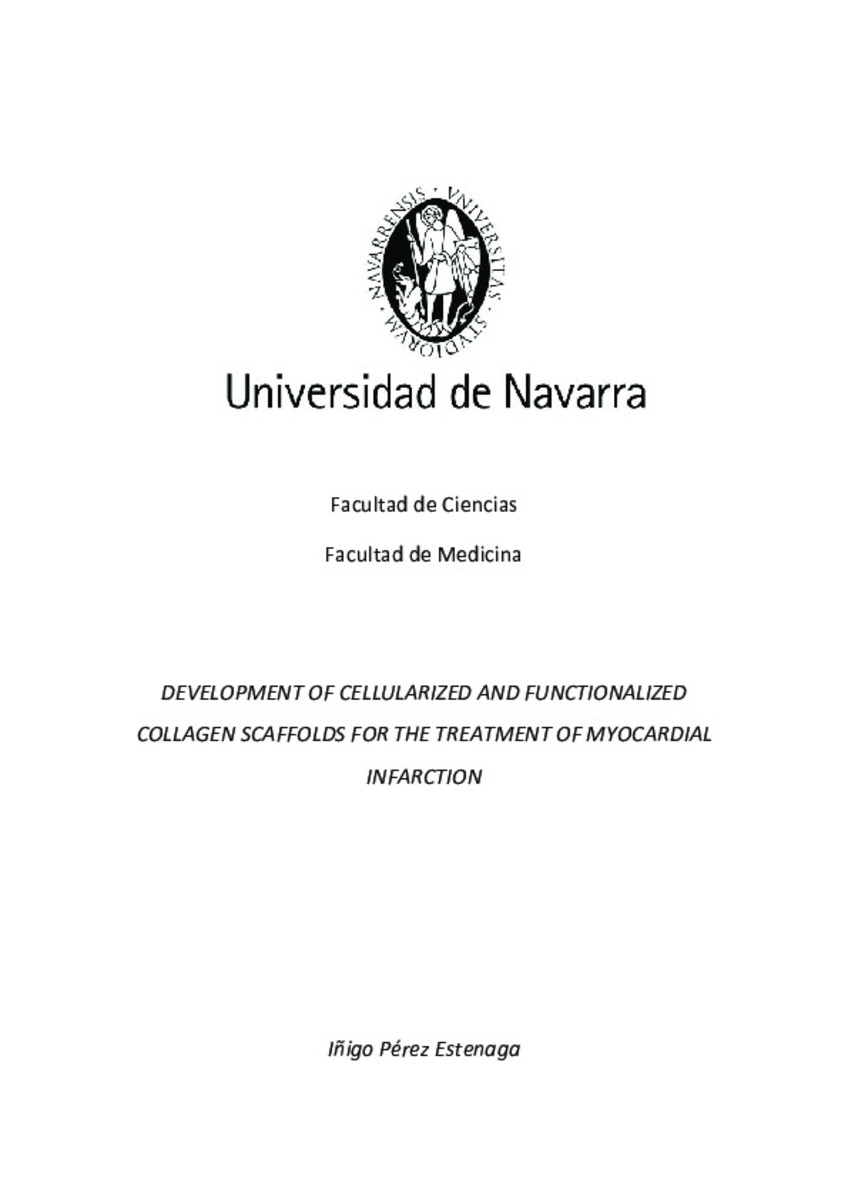Full metadata record
| DC Field | Value | Language |
|---|---|---|
| dc.contributor.advisor | Pelacho, B. (Beatriz) | - |
| dc.creator | Pérez-Estenaga, I. (Iñigo) | - |
| dc.date.accessioned | 2021-06-15T11:14:03Z | - |
| dc.date.available | 2021-06-15T11:14:03Z | - |
| dc.date.issued | 2021-06-15 | - |
| dc.date.submitted | 2020-11-13 | - |
| dc.identifier.citation | PÉREZ ESTENAGA, Íñigo. “Development of cellularized and functionalized collagen scaffolds for the treatment of myocardial infarction". Pelacho, B. (dir.). Tesis doctoral. Universidad de Navarra, Pamplona, 2020. | es_ES |
| dc.identifier.uri | https://hdl.handle.net/10171/60694 | - |
| dc.description.abstract | Cardiovascular diseases (CVD) are the leading cause of death in the developed countries. According to the las report of the European Society of Cardiology, CVD remain the most common cause of death within Europe, accounting for 2.2 million deaths in females and 1.9 million deaths in males. These equate to 47% and 39% of all deaths in females and males, respectively, and almost half of them are caused by Myocardial Infarction (MI). In the last 20 years, in order to overcome the limitations of the conventional treatments, cell therapy, has emerged as a promising therapeutic option for the treatment of MI. In this thesis we have employed Adipose Derived Mesenchymal Stem Cells (ADSC) seeded in a collagen scaffold fabricated under GMP-conditions, to treat the infarcted heart in preclinical MI animal models. First, we assessed the patch safety in rodent models, proving a safe profile of the system, established by tumorigenicity, toxicity and biodistribution studies. Secondly, the collagen scaffold was cellularized with allogeneic ADSC and its immunological effect was analysed both in vitro and in vivo, showing no alloreactive response by the immune cells towards the allogeneic patch. Moreover in vitro, in a human context, the cellularized patch elicited a potent immunomodulatory effect towards lymphocytes by inhibiting their proliferation, phenotypical activation and pro-inflammatory cytokine production. Finally, the functionalization of the collagen membrane with the angiogenic factor SDF-1 was achieved, by the creation of a bilayer collagen scaffold, which confirmed to be biocompatible in vivo and exerted a therapeutic effect when tested in a rat MI model in the shape of cardiac function recovery. | es_ES |
| dc.language.iso | eng | es_ES |
| dc.publisher | Universidad de Navarra | es_ES |
| dc.rights | info:eu-repo/semantics/openAccess | es_ES |
| dc.subject | Materias Investigacion::Ciencias de la vida::Citología, biología celular | es_ES |
| dc.subject | Materias Investigacion::Ciencias de la Salud::Microbiología y biología molecular | es_ES |
| dc.subject | Materias Investigacion::Ciencias de la vida::Inmunología | es_ES |
| dc.title | Development of cellularized and functionalized collagen scaffolds for the treatment of myocardial infarction | es_ES |
| dc.type | info:eu-repo/semantics/doctoralThesis | es_ES |
Files in This Item:
Statistics and impact
Items in Dadun are protected by copyright, with all rights reserved, unless otherwise indicated.






